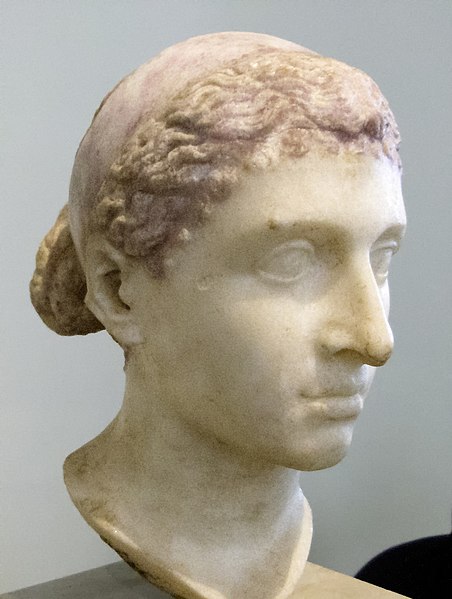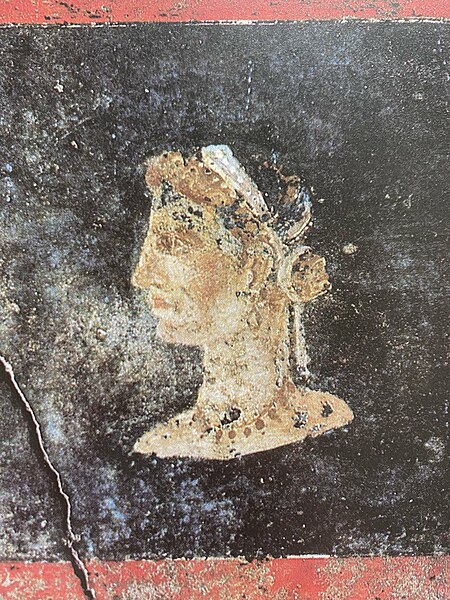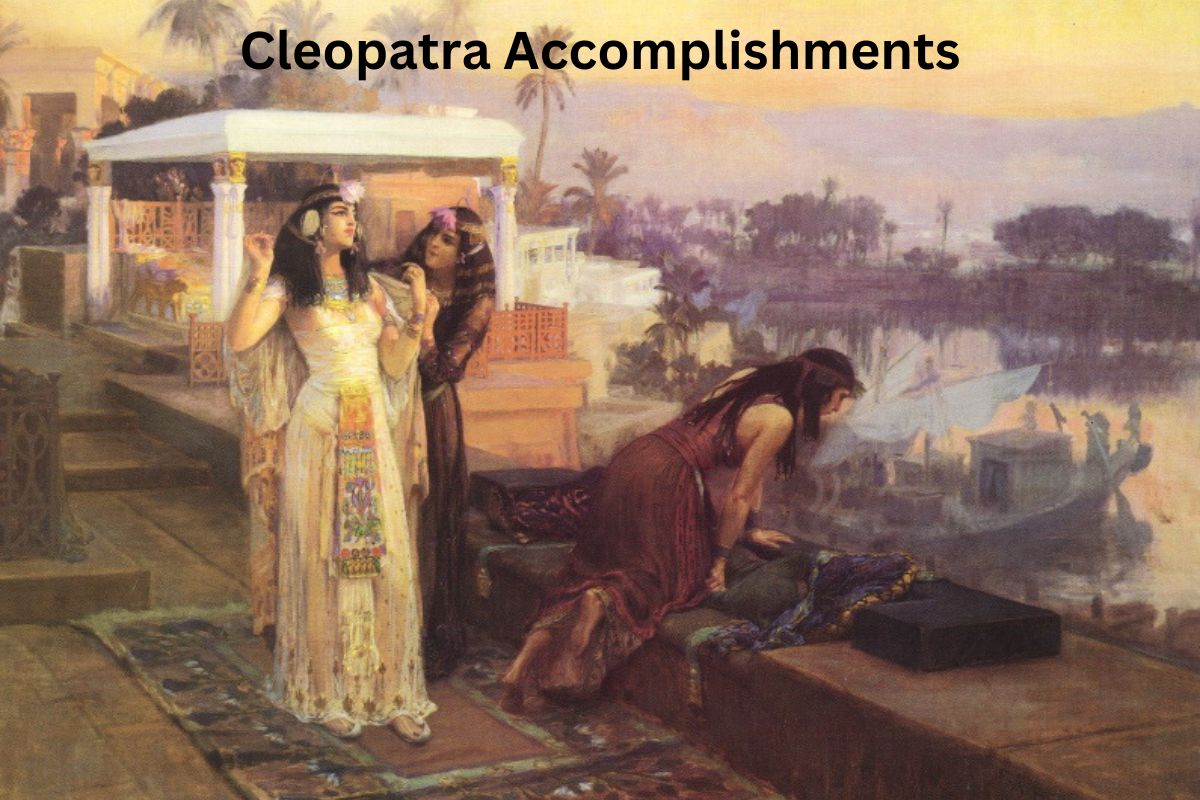Cleopatra VII, the last active ruler of the Ptolemaic Kingdom of Egypt, is one of history’s most renowned figures. Ascending to the throne at a young age, Cleopatra achieved numerous accomplishments throughout her reign.
From strengthening Egypt’s economy and expanding its territories to her diplomatic acumen and cultural patronage, Cleopatra’s intelligence and strategic thinking left a lasting impact on Egypt and the ancient world.
Her alliance with Julius Caesar and later with Mark Antony further solidified her political influence. Cleopatra’s enduring legacy as a powerful and influential ruler continues to captivate people’s imaginations to this day.
Accomplishments of Cleopatra
1. Ascension to the throne of Egypt
Cleopatra VII became the queen of Egypt in 51 BCE, following the death of her father, Ptolemy XII Auletes. At the time of her ascension, Egypt was facing political unrest and economic challenges.
Also Read: Facts About Cleopatra
Despite being initially forced to share power with her younger brother, Cleopatra eventually asserted her authority and became the sole ruler of Egypt. Her ascension marked a significant turning point for the Ptolemaic dynasty and set the stage for her subsequent accomplishments.

2. Implementation of economic reforms to strengthen Egypt’s economy
Recognizing the importance of a stable and thriving economy, Cleopatra enacted various reforms to bolster Egypt’s financial health. She reduced taxes on agriculture, a crucial sector of the Egyptian economy, which not only relieved the burden on farmers but also encouraged agricultural production.
Also Read: Timeline of Queen Cleopatra VII
Cleopatra also promoted trade and commerce, fostering economic growth and prosperity in the kingdom. These measures contributed to the stabilization of Egypt’s economy and brought about an era of relative prosperity during her reign.
3. Multilingualism and promotion of arts and sciences
Cleopatra was renowned for her intellect, linguistic abilities, and patronage of the arts and sciences. She was fluent in multiple languages, including Egyptian, Greek, and Latin, enabling her to communicate effectively with a diverse range of individuals.
Her court in Alexandria became a center of intellectual and cultural excellence. She attracted renowned scholars, philosophers, and artists from across the ancient world, fostering a vibrant intellectual atmosphere.
Cleopatra’s support for literature, architecture, and scientific research contributed to the advancement of various fields and the preservation of knowledge. Her patronage of the arts and sciences further enhanced Egypt’s cultural prestige and solidified her own reputation as a cultured and enlightened ruler.
4. Establishment of a powerful navy and alliance with Rome
Recognizing the strategic importance of maritime power, Cleopatra prioritized the development of Egypt’s navy. She expanded and modernized the fleet, ensuring that Egypt had a formidable naval force to protect its interests and secure trade routes in the Mediterranean.
Cleopatra’s navy played a crucial role in defending Egypt’s borders, deterring potential aggressors, and projecting the kingdom’s power beyond its shores.
Additionally, Cleopatra formed a political alliance with Rome, initially through her relationship with Julius Caesar and later with Mark Antony.
These alliances provided Egypt with influential Roman support, bolstering its political position and safeguarding its autonomy.
5. Expansion of Egypt’s territory
Cleopatra’s reign witnessed the expansion of Egypt’s territorial holdings. She sought to reclaim regions that had been lost to rival powers, such as parts of Syria and Palestine.
Cleopatra successfully extended Egypt’s influence over these territories, consolidating her authority and reinforcing Egypt’s control in the Eastern Mediterranean.
Through strategic alliances and military campaigns, Cleopatra expanded Egypt’s sphere of influence, further solidifying the kingdom’s position as a regional power.

6. Diplomatic prowess and strategic alliances
Cleopatra’s diplomatic skills and political acumen were instrumental in maintaining Egypt’s independence and securing its interests amidst the complex web of power dynamics in the ancient world. She adeptly navigated the political landscape, forging alliances with influential figures and nations.
Her relationships with Julius Caesar and Mark Antony are notable examples. Cleopatra used these alliances to protect Egypt’s sovereignty, gain support for her reign, and safeguard her kingdom against external threats.
Through careful negotiations and strategic partnerships, Cleopatra ensured Egypt’s survival and stability in a tumultuous era, solidifying her reputation as a shrewd and effective diplomat.
7. Collaboration and relationship with Julius Caesar
Cleopatra’s relationship with Julius Caesar was a significant turning point in her reign. Seeking to secure her position as the ruler of Egypt, Cleopatra strategically aligned herself with Caesar during his visit to Egypt in 48 BCE. Their relationship grew into a romantic affair, and Cleopatra bore Caesar a son named Caesarion.
This alliance not only helped Cleopatra solidify her power but also brought wealth and stability to Egypt. Caesar supported her claim to the throne and provided military and financial assistance, reinforcing her position as the queen of Egypt.
8. Patronage of architecture and construction projects
Cleopatra was known for her patronage of architecture and construction projects throughout Egypt. She invested heavily in the development of cities, temples, palaces, and monuments.
Alexandria, the capital of Egypt, flourished under her reign as a center of culture and intellectual exchange. Cleopatra commissioned the construction of iconic structures like the Temple of Isis at Philae and the Caesareum, a grand temple dedicated to Julius Caesar.
Her architectural patronage not only enhanced the beauty and grandeur of Egypt but also contributed to the kingdom’s cultural legacy.
9. Intelligence and strategic thinking
Cleopatra was renowned for her intelligence, wit, and strategic thinking. She possessed a keen understanding of politics and power dynamics, which she utilized to protect Egypt’s interests. Cleopatra was well-versed in diplomacy and possessed the ability to form strategic alliances with influential leaders.
Her ability to navigate complex political situations and her astute decision-making played a crucial role in safeguarding Egypt’s autonomy and expanding its influence during a time of great upheaval in the ancient world.
10. Enduring legacy and cultural impact
Cleopatra’s life and reign continue to capture the imagination of people around the world. Her story has inspired countless works of literature, art, and film, solidifying her place as one of history’s most iconic figures.
Cleopatra’s intelligence, beauty, and political acumen have made her a symbol of female power and leadership. She is often portrayed as a charismatic and influential ruler who defied societal norms. Cleopatra’s cultural impact extends beyond her own time, leaving an indelible mark on history and popular culture as a symbol of ancient Egypt’s grandeur and intrigue.
